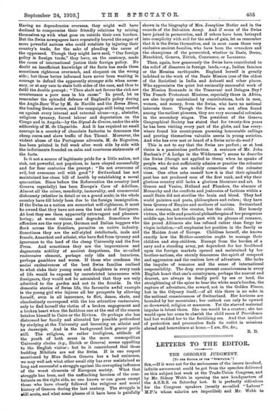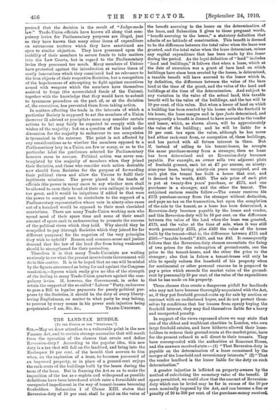LETTERS TO THE EDITOR.
THE OSBORNE JUDGMENT.
[To THIS EDITOZ Or THZ "SPHCTA.T01...1
Sra,—If it were not for the seriousness of the issues involved, infinite amusement could be got from the speeches delivered on this subject last week at the Trade-Union Congress, and by Mr. Sidney Webb in opening the new headquarters of the A.S.R.S. on Saturday last. It is perfectly ridiculous for the Congress speakers (mostly so-called "Labour" M.P.'s whose salaries are imperilled) and Mr. Webb to pretend that the decision is the result of "Judge-made law." Trade-Union officials have known all along that com- pulsory levies for Parliamentary purposes are illegal, just as they have known that many other items of expenditure on extraneous matters which they have sanctioned are open to similar objection. They have presumed upon the inability of their members to secure funds to take matters into the Law Courts, but in regard to the Parliamentary levies they presumed too much. Many members of Unions have protested against the introduction at various times of costly innovations which they considered had no relevance to the true objects of their respective Societies, but a recognition of the hopelessness of attempting to fight against executives armed with weapons which the members have themselves assisted to forge (the accumulated funds of the Unions), together with the knowledge that they would have to submit to tyrannous procedure on the part of, or at the dictation of, the executives, has prevented them from taking action.
In matters affecting the trade in the interests of which a particular Society is supposed to act the members of a Union (however ill advised or precipitate some may consider certain actions to be) may fairly be expected to comply with the wishes of the majority; but on a question of the kind under discussion for the majority to endeavour to use compulsion is tyrannical in the extreme. The point is not affected by any considerations as to whether the members opposed to a Parliamentary levy in a. Union are few or many, or as to the particular label the gentleman selected for Parliamentary honours cares to assume. Political action was never con- templated by the majority of members when they joined their Societies, and those who consider such action desirable now should form Societies for the purpose of forwarding their political views and allow the Unions to fulfil their legitimate missions. The power placed in the hands of officials (the power in many eases to say whether men shall be allowed to earn their bread at their own callings) is already too great, and it would be iniquitous if added to that were the power to compel men to contribute to the support of a Parliamentary representative whose vote in ninety-nine cases out of a hundred would be opposed to their most cherished convictions. There are many Trade-Union working men who spend most of their spare time and some of their small amount of spare cash in endeavouring to promote the success of the political views which they hold. Why should they be compelled to pay (through Societies which they joined for far different purposes) for the negation of the very principles they wish to uphold ? Reason and common-sense and justice demand that the law of the land (far from being weakened) should be strengthened for their protection.
Therefore it is that many Trade-Unionists are waiting anxiously to see what the present invertebrate Government will do in this matter. It is to be hoped that no one will be misled by the figures announced as being for and against the Congress resolution,—figures which really give no idea of the strength of the feeling in many Trade-Union quarters against the com- pulsory levies. If, however, the Government, in order to retain the support of the so-called " Labour "Party, endeavour to pass a Bill to legalise payments for purely political pur- poses by the Societies, it should be the duty of every liberty- loving Englishman, no matter to what party he may belong, to prevent by every means in his power such injustice being











































 Previous page
Previous page